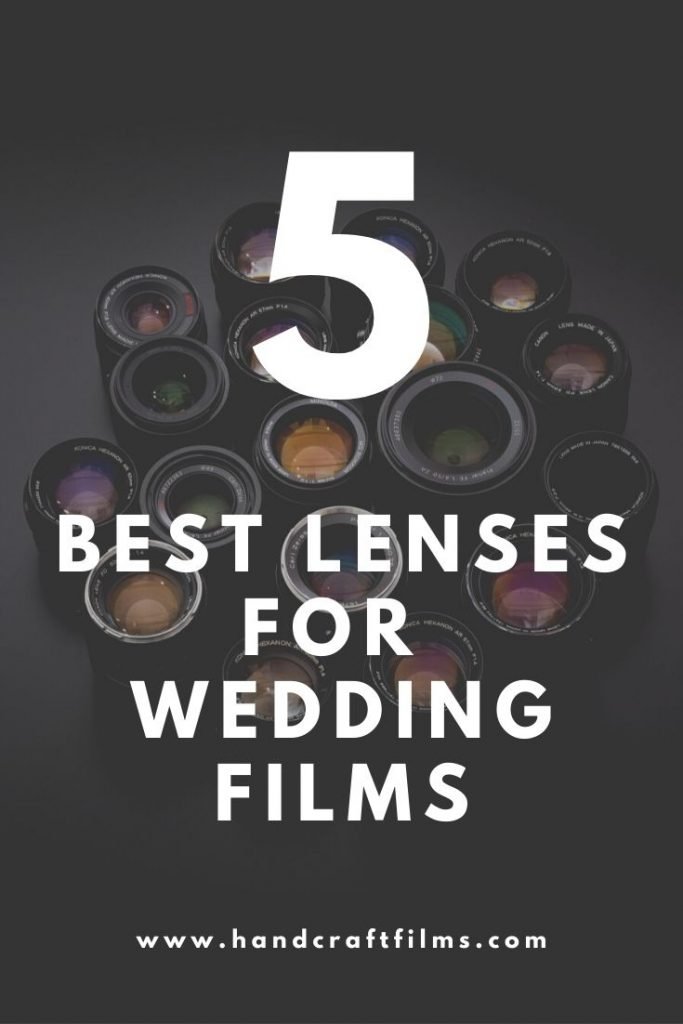In my opinion, wedding filmmakers are some of the most talented of all filmmakers. The reason is because when done right, they make it look easy.
The truth is, it isn’t easy. I know firsthand because I’ve shot a number of weddings myself.
Not only are you catching spontaneous, unplanned moments on the fly, you’re also floating between such a variety of lighting situations and settings that you are constantly switching gear to make sure you don’t miss a single thing.
After awhile, you begin to develop a system that makes the process smoother, but you’re still constantly changing gear to fit the situation.
Add one more challenge – you have to do it quickly and quietly. Like a ninja.
The first thing many people think about when it comes to wedding video gear is the camera. But honestly, I believe the best lens choices are far more important even than the camera.
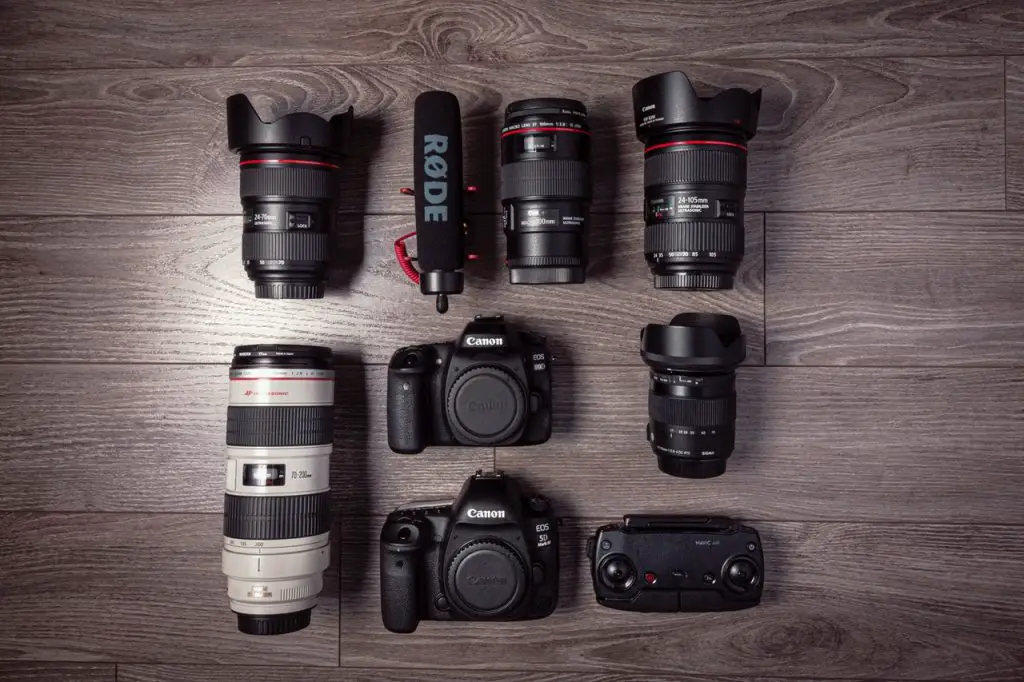
Lenses are a lifetime investment.
The technology behind cameras changes drastically every 3-5 years. As such, you’ll likely be buying a new one as you can afford them every 3-5 years.
But lenses are different.
I’ve cycled through 3-4 nice video cameras but I’ve kept every single lens I’ve acquired over the past 15 years of my career.
If you invest in a good quality lens, the technology hardly changes. Sure there are some upgrades every 10 years or so, but they aren’t usually life changing.
Your set of lenses (likely Canon if you’re reading this article) can grow with you and your variety of cameras as you upgrade them.
I started shooting on a Canon 7D, upgraded to a few 5D renditions, and now I shoot primarily on the 1DX Mark ii. All with the same set of Canon lenses.
For this reason, I also highly recommend that you stick with the L-series Canon lenses if you can afford to do so. They are more expensive, but they are worth it.
What is an L-series Canon Lens?
L-series lenses carry the very specific red ring around the lens body itself, so you’ll know by looking. It’s an elite series of lenses made by Canon that are marked by their superior professional quality. They will be faster, more durable (often weather sealed), and sharper than any other set of lenses.
In this article, we’ll cover the best overall Canon lens for shooting wedding videos, as well as specialized lenses for different settings throughout a wedding video.
Be sure to check out our other related posts for wedding filmmakers: best music for wedding films and best microphones for filming weddings.
This post does contain Amazon product recommendations. As an Amazon associate, I receive compensation for qualifying purchases, however any commission that I earn comes at no cost to you.
1. Most Versatile // Best Overall Canon Lens for Wedding Videos
If you have to choose just one lens, this is going to be the one.
You could shoot an entire wedding with just this lens. It’s that versatile and that good of quality.
In fact, it’s the lens I use most overall with most of my filmmaking.
So if you are asking which lens to start with, or if you can just afford one for the moment, here it is.
What I like the most about the Canon 24-70mm lens:
- Versatility: because it’s a zoom lens, you can shoot a large variety of angles from close-up to wide without having to change your lens setup.
- The focal range falls in between a zoom lens and a wide lens and hits the most common lengths that you’ll be shooting throughout the wedding day.
- Quality: prime lenses always get the best wrap when it comes to quality, but this lens has nothing to hide. The sharpness and color quality are excellent, as well as the bokeh and dreaminess that you can achieve at 70mm with this lens.
This lens is perfect for:
- The moments that are the most unpredictable: first looks, surprises from the bride/groom, walking down the aisle, first dance, slicing the cake, and so many more.
Any disadvantages to this lens?
- Nothing major. The only thing I would point out is that it is a rather large lens. Definitely not a dealbreaker, but something to keep in mind.
Which Canon cameras is this lens compatible with?
This is an EF-mount Canon lens. That means it’s compatible with DSLR Canon video cameras.
If you are purchasing through amazon, be sure to enter your camera model into the amazon confirmed fit box to be sure it’s compatible with your camera.
This will the be the case with all the lenses on this list. They are all EF specific for Canon DSLR cameras.
2. Best Portrait & Detail Lens for Wedding Films
When I think of great wedding films, I think dreamy, cinematic, romantic. This is the lens to make that happen.
I purchased this lens early on this year and I can tell you – it’s amazing.
And it surprised me.
I knew it would be great for close ups and buttery soft bokeh in the background. But I also thought it may be a lens that I only used a portion of the time I shoot.
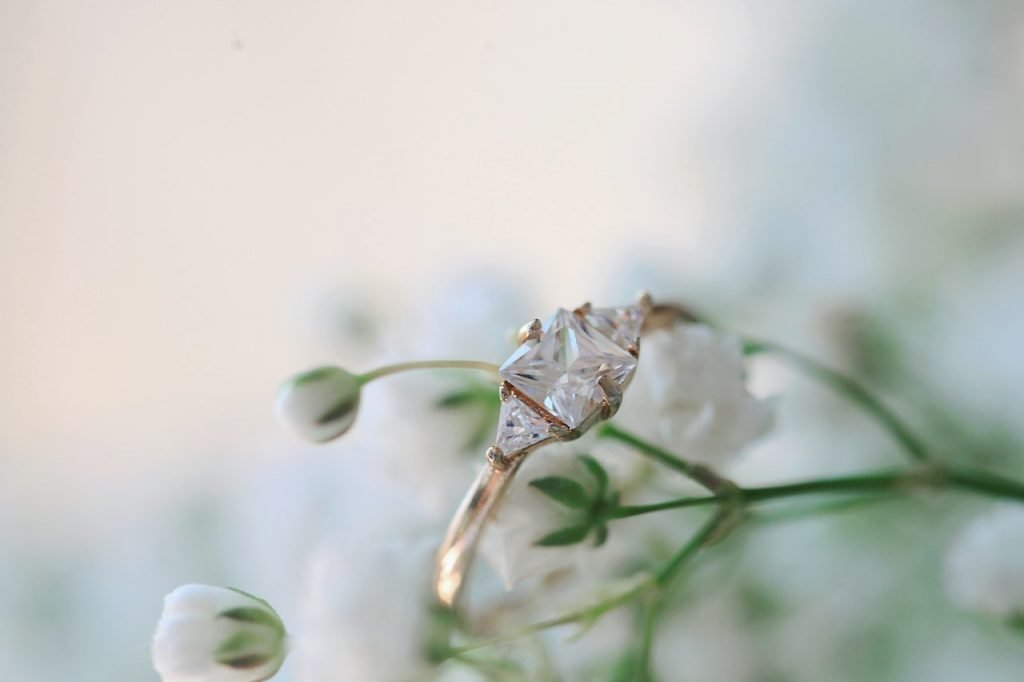
What I found is that I ended up using this lens almost more than my 24-70mm lens. Even though it’s a prime (there is no zooming in or out), I just loved the look so much that it ended up staying glued to my camera most of the time.
What I like the most about the Canon 50mm f/1.2 lens:
- Quality and look: this lens delivers the most beautiful video quality. Your subject will be super crisp and sharp and the background will be perfectly, buttery soft and beautiful. Seriously, you don’t even need to stage a beautiful background for shots with this lens, it will do it naturally.
- Ability to capture low light: because the aperture is so wide on this lens, it’s great at shooting in low lit situations, which makes it great for evening and reception settings.
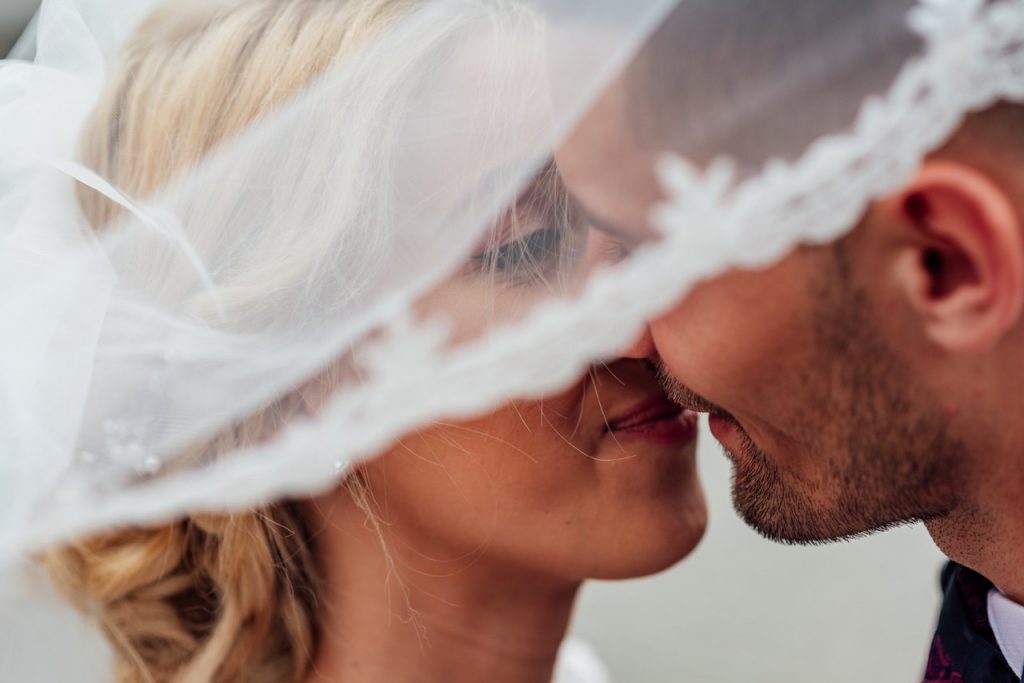
This lens is perfect for:
- Portraits: this lens is known for capturing beautiful portraits, where the subject’s face is sharply in focus and the background is beautifully blurry
- Detail Shots: perfect for set up shots – details of the bride’s dress, shoes, jewelry, accessories for the groom, little scenery details throughout the film. Because the aperture can open up to 1.2, you can really isolate small areas that you want to focus on in your shots.
- Reception / Low Light Settings: again, because the aperture can open up so wide with this lens, it is the absolute best at capturing video in low light scenarios, like receptions or outdoor settings at night.
Any disadvantages with this lens?
- I wouldn’t necessarily call this a disadvantage, but I will point out that this lens requires more practice than some others. Because the aperture is so wide, the focus can be razor thin. It takes some practice and experience to nail focus and keep it on some shots.
3. Best Lens for Scenery and Outdoor Shots
Another important series of shots that every wedding filmmaker will need to capture are great establishing shots of the venue and ceremony.
With each scene in the video, you’ll likely be capturing a handful of wide shots of the surroundings. And to do so, you need at least one medium to wide lens.
With a bit of a zoom on this lens, you have the flexibility needed to capture a variety of angles from wide to medium. I find the range of 16-35mm to be perfect for capturing wide spaces without distorting the image at all.
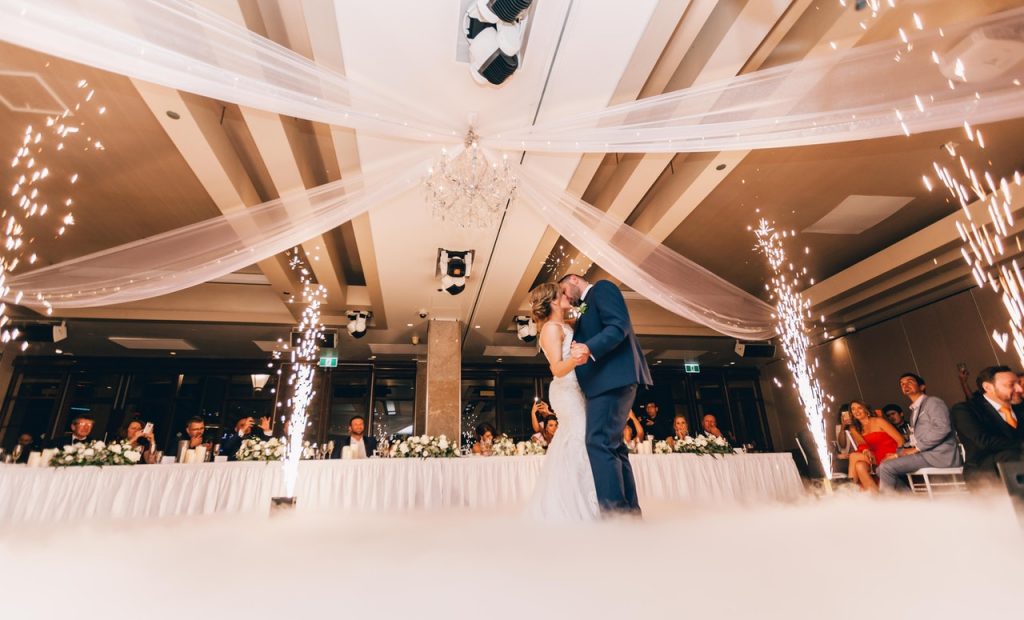
At 35mm you are capturing the closest representation of what our eyes see, which is always a great way to approach your videos. It will feel the most ‘documentary’ and like your viewer is ‘in the moment’ with you.
But with a wider option, all the way up to 16mm, you still have some ability to zoom out if needed – perfect for smaller spaces where you want to capture the whole scene or for very large outdoor settings where you want to capture the entire setting.
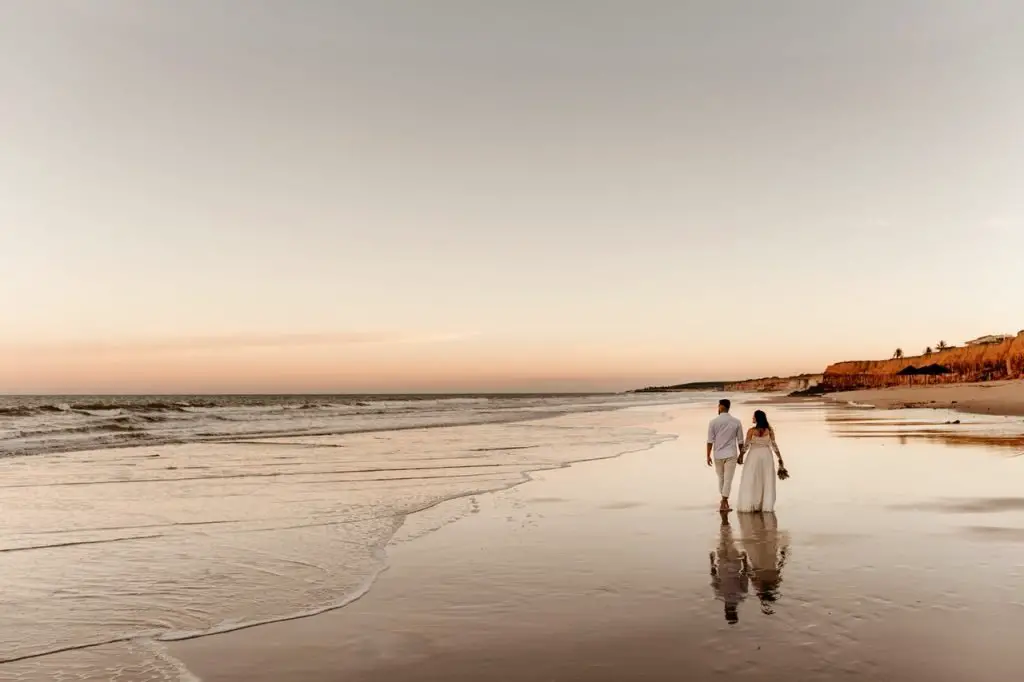
Here’s my recommendation for the best all around medium-wide lens.
What I like the most about the Canon 16-35 mm lens:
- Sharpness: this lens is truly great at capturing all the details in a full scene.
- Flexibility: I love that there is still some freedom in finding the exact focal length for capturing all your scenery shots.
This lens is perfect for:
- Establishing shots and setting new scenes: perfect focal length for a variety of outdoor and indoor scenery shots throughout the wedding
- Ceremony Second Angle: because it’s a bit wider, it is the perfect lens to set on a second camera during the entire ceremony to capture a great wide/medium shot.
4. Best Zoom Lens for Ceremony Shots
As a wedding filmmaker, you know the importance of staying out of sight as much as possible. Nothing is more annoying to the audience than a crew of filmmakers and photographers huddled in the front row blocking everyone’s view.
There are also venues that simply won’t allow you to get too close to the alter.
For this reason, every wedding filmmaker needs a good zoom lens. But there are a lot of options out there. Which is the best and why?
Here is my favorite, the Canon 70-200mm f/2.8L and there are a few reasons why which we’ll cover in a second.
What I like the most about the Canon 70-200 mm f/2.8L lens:
- Can handle low light: there is another version of this lens with an f/4 aperture. I recommend paying a bit more for this version, the f/2.8. Because of this wider aperture, you’ll be able to shoot in dimmer settings, which is often the case in churches or candlelit venues.
- Sharpness: even at 200mm, you’ll be able to capture great details during the ceremony even from far away.
This lens is perfect for:
- Close Ups: it’s the ideal lens for close ups during the ceremony as well as shots throughout the day if you need to be close but can’t physically get closer to your subject
Any disadvantages to this lens?
- Versatility: while it’s great at what it does, you can’t get by with only this lens. You’ll definitely need at least the 24-70mm or something similar to go with this lens.
- Stability: because of the extreme focal length of this lens, any micro movements will be very noticeable in a video. For this reason, you will definitely need to keep this lens on a stable tripod.
5. Best Low Light Lens for Wedding Reception Shots
It’s the end of the day and your wedding party has moved to the reception. The photographer has a flash light set up to assist with low lights, but what can you do with video?
A lot of the ability to handle low light comes down not only to the camera you’ll be using, but especially to your lenses.
The key here is to use a lens with a very wide aperture.
I have a few recommendations for great lens choices here. They are very similar, but of varying focal lengths depending on what you already have and what you’d prefer to shoot with.
The first is one that I have used and loved for years. It’s a prime lens, so you’ll have to use your feet to zoom in and out, but I love it for receptions especially because it’s a 35mm.
This means all my shots are going to feel very ‘in the moment’ since 35mm imitates the length that the naked eye sees.
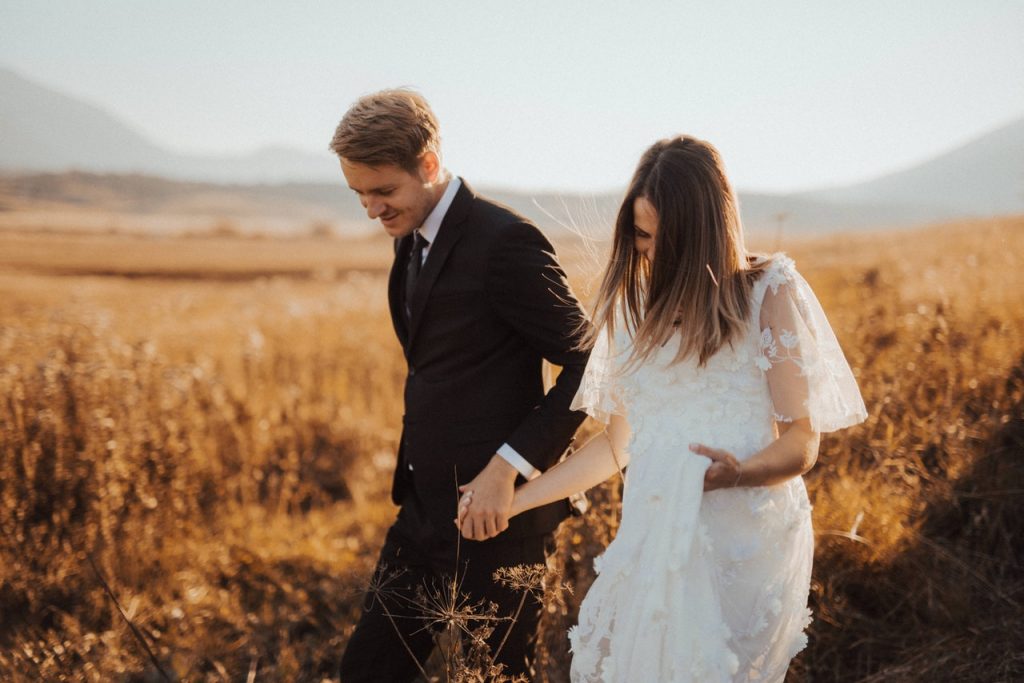

It’s also an f/1.4, which means it can open very wide to handle low light situations.
I also own the 50mm f/1.2 and the 85mm f/1.4. They are also excellent choices in this category and will give you a little bit more zoom if that’s what you’re after.
If you go with the 80mm, just remember you’ll likely need to have it on either a tripod or a monopod to add some extra stabilization to your shots.
6. Best Canon Lenses for Wedding Videos on a Budget
It’s taken years to grow my lens collection to where it is today.
I mentioned before that each lens is an investment. I understand completely how expensive each and every lens on this list is and therefore am no stranger to the fact that it just isn’t possible to start with some of these lenses right off the bat.
I still highly recommend saving and doing what you can to invest in the best lenses that will grow with you throughout the years. This means sticking with L-series lenses (the ones with the little red ring on the front).
However, I wanted to include a few great alternatives for those first few years where you simply may not be able to drop a few grand on a new lens.
Here are a variety of excellent choices without breaking the bank too much. I’ve included the same variation of focal lengths so you can compare their advantages to the list above for specific scenarios throughout the wedding day.
7. Lens Accessories You May Need for Wedding Videos
I wanted to also add a few notes about accessories you may need along with your lens kit.
As a wedding filmmaker, you have to be quick and efficient and the only way to achieve that is with extreme organization and ease of equipment use.
Here are a few tools I’ve found helpful during wedding shoots that I thought may help you as well.
Extra Lens Caps – Anyone else constantly losing these? I love this universal design so you can slide them on just about any sized lens and forget about it. I also love that they have a bit of extra cushion to them, adding a bit of extra security against bangs and bruises.
Lens Cleaning Kit – I prefer this cleaning liquid and a simple cleaning cloth to clean any smudges or dust throughout the day. I clean them before I begin shooting, every few hours, and then again as I’m cleaning up my equipment for the night.
UV / Polarizing Filters – I have a UV filter on every single lens and the reason is twofold. First, it’s added protection against scratches or cracks on the lens itself, plus an added layer of protection against dust and humid air that can seep into the lens over time. Second, it blocks out UV haze from the sun and makes your images and video sharper and more vibrant.
You can find them for very cheap on amazon, but I actually recommend spending just a bit more for a quality brand. This is my favorite brand and you’ll be guaranteed a perfect fit, plus crystal clear protection to your lens. You’ve spent so much on a lens, you definitely want to make sure it’s well protected.
I’ve had two separate occasions where I’ve dropped a lens. In both cases the UV filter cracked, but saved the lens.
Make sure to select the correct size for the lens you’ll be using the filter with:
Concluding Thoughts
That’s it! Probably all you’ll ever need to be fully equipped for your wedding videos. I know it will take time to build up, but make a budget and set goals. Purchase a new lens each year with some of that hard-earned money and you’ll be where you need to be in no time.
Let me know what lens stays on your camera the most in the comment section below.
Happy shooting!
-Beth
Share on Pinterest:
